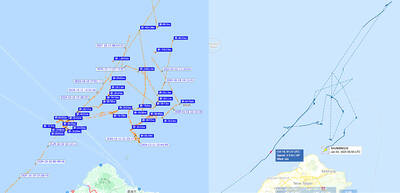Newly implemented labor laws on vacation days and the 40-hour workweek are set to have the biggest impacts on the service, old economy and retail sectors, according to the results of a survey published by an online human resources firm yesterday.
The firm, 1111.com.tw, said the new rules that took effect on Dec. 23 last year after the legislature revised the Labor Standards Act (勞動基準法), have seriously affected the labor market and would test the flexibility of businesses as they respond to the changes.
The survey of local businesses found that 77 percent of respondents did not fully understand the new system, while 4.5 percent said they did not understand it at all.
Of those polled, 36.8 percent said they had a partial understanding of the system, while 35.6 percent said they understood most of it, but they still had some questions.
Sixty-eight percent of respondents expected the new rules to affect their operations, including 12.2 percent that believe they would “have a big impact.”
Businesses cited “personnel cost increases,” “difficulties in meeting staffing requirements,” and “a big increase in overtime pay” as the main challenges they faced in coping with the new regulations.
Affected businesses said they were “changing their shift schedules,” “adding part-time workers,” and “hiring full-time workers” in response.
The results were part of a survey on the willingness of businesses to hire people in the first quarter of this year, with 33 percent of respondents saying they felt the economy would improve, 47 percent saying it would be about the same as last year, and 20 percent predicting the economy would get worse.
On the willingness of businesses to hire people, 61.7 percent of respondents said they intended to take on more staff in the first quarter of the year, with the companies most upbeat on headcount in the service, medical, agricultural, livestock and information and technology sectors.
The businesses identified “filling vacancies,” “regular recruitment,” and “searching for talent at a time when many people are changing jobs” as the main reasons for looking to boost staff numbers.
Under new labor rules, total maximum working hours for employees have been reduced to 40 hours per week from 84 hours every two weeks, and workers are now entitled to one mandatory day off and one “flexible” rest day per week — all measures that could increase operating costs.
Employers face much higher overtime costs if they have employees work on their “flexible” day off, and they are not allowed to have staff work on their mandatory day off, because the rules mandate that workers can work no more than six consecutive days.

DEEPER REVIEW: After receiving 19 hospital reports of suspected food poisoning, the Taipei Department of Health applied for an epidemiological investigation A buffet restaurant in Taipei’s Xinyi District (信義) is to be fined NT$3 million (US$91,233) after it remained opened despite an order to suspend operations following reports that 32 people had been treated for suspected food poisoning, the Taipei Department of Health said yesterday. The health department said it on Tuesday received reports from hospitals of people who had suspected food poisoning symptoms, including nausea, vomiting, stomach pain and diarrhea, after they ate at an INPARADISE (饗饗) branch in Breeze Xinyi on Sunday and Monday. As more than six people who ate at the restaurant sought medical treatment, the department ordered the

A strong continental cold air mass and abundant moisture bringing snow to mountains 3,000m and higher over the past few days are a reminder that more than 60 years ago Taiwan had an outdoor ski resort that gradually disappeared in part due to climate change. On Oct. 24, 2021, the National Development Council posted a series of photographs on Facebook recounting the days when Taiwan had a ski resort on Hehuanshan (合歡山) in Nantou County. More than 60 years ago, when developing a branch of the Central Cross-Island Highway, the government discovered that Hehuanshan, with an elevation of more than 3,100m,

Taiwan’s population last year shrank further and births continued to decline to a yearly low, the Ministry of the Interior announced today. The ministry published the 2024 population demographics statistics, highlighting record lows in births and bringing attention to Taiwan’s aging population. The nation’s population last year stood at 23,400,220, a decrease of 20,222 individuals compared to 2023. Last year, there were 134,856 births, representing a crude birth rate of 5.76 per 1,000 people, a slight decline from 2023’s 135,571 births and 5.81 crude birth rate. This decrease of 715 births resulted in a new record low per the ministry’s data. Since 2016, which saw

SECURITY: To protect the nation’s Internet cables, the navy should use buoys marking waters within 50m of them as a restricted zone, a former navy squadron commander said A Chinese cargo ship repeatedly intruded into Taiwan’s contiguous and sovereign waters for three months before allegedly damaging an undersea Internet cable off Kaohsiung, a Liberty Times (sister paper of the Taipei Times) investigation revealed. Using publicly available information, the Liberty Times was able to reconstruct the Shunxing-39’s movements near Taiwan since Double Ten National Day last year. Taiwanese officials did not respond to the freighter’s intrusions until Friday last week, when the ship, registered in Cameroon and Tanzania, turned off its automatic identification system shortly before damage was inflicted to a key cable linking Taiwan to the rest of